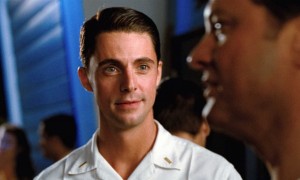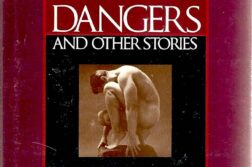NEAR THE BEGINNING of A Single Man, the novel by Christopher Isherwood on which Tom Ford’s new movie [in 2009]is based, a college English professor named George tells his class the story of Tithonus, a beautiful mortal who, after the goddess in love with him asks Zeus to grant him immortality, ages into a very old man because the goddess has forgotten to ask for the gift of eternal youth. Tithonus eventually becomes a creature so dry and rasping that he turns into a cicada. Why, one wonders, is that in the book? Because the issues the fable deals with—love, immortality, youth, old age—are the same ones played out in Isherwood’s account of what is to come: the professor’s last day on earth.
In the movie, however, this speech is missing—which made me think, on rereading A Single Man the day after seeing the film: nothing in mythology is stranger than the way a book is turned into a film. It was surprising enough when news came that Ford, till now a successful fashion designer, was filming Isherwood’s novel, since so much of it takes place in the professor’s head. A Single Man

is largely stream of consciousness. Nothing much happens. We watch George wake up, dress, drive to campus, teach a class on Aldous Huxley’s novel After Many a Summer Dies the Swan (which inspires the story of Tithonus), visit a gym, shop for groceries, get drunk at dinner with an old friend, and end up at his favorite bar, where he meets a student he goes swimming with and later takes home. Along the way, he remembers his previous life with his partner Jim, before Jim was killed in an accident. But these flashbacks are brief; the primary stuff of the novel is the contrast between the mundane quality of George’s day and his rich interior life: his thoughts on teaching, age, Los Angeles, England, a dozen other things. The book is moving, in part, because it is so uncomplaining. Jim’s death is never harped on; in fact, A Single Man is more about aging—aging alone—because Isherwood wrote it at a time in his life when he feared his partner Don Bachardy was going to leave him. It’s an assessment, really, of Isherwood’s own condition, an answer to the question “Could I go on without him?”
Because it’s so full of life—and true to life—A Single Man is never depressing. George is alienated, he’s lonely, but he’s keenly aware of the world he lives in, and at the end of his day, while having dinner with his friend, George “begins to feel this utterly mysterious unsensational thing—not bliss, not ecstasy, not joy—just plain happiness. Das Glueck, le bonheur, la felicidad.” Finally George decides that he can go on—he will look for another Jim.
In the movie, on the other hand, George is so depressed from the start that people keep telling him how awful he looks (which makes no sense; he looks like Colin Firth)—and only the audience knows the reason why: George is packing heat. He’s got a gun, a gun with which he plans to end his life. Movies, no doubt, require a narrative suspense that prose works do not. There is a great deal in both the printed and filmed versions of A Single Man about the past, the present, and the future (has anyone ever told us not to live in the present?), and a movie takes place in the present in a way a book does not. In the book, George’s observations are so interesting that we gladly follow him around without knowing where we’re going. In a movie, I guess you need a gun.
This makes the film melodramatic. The friend I sat with got up to pee halfway through and when he returned from the men’s room after learning from the ticket taker in the lobby that the movie still had half an hour to run, he sat down and whispered, “Can’t he just die?” Meanwhile, I was hoping the gun would go off accidentally, since George apparently could not bring himself to use it.
Nietzsche said the thought of suicide had gotten him through many a bad night, but during its first half A Single Man has a bad case of The Hours. In the book, “the sloth of sadness” is precisely what George wants to avoid; in the movie he’s drowning in it. The film even opens with a beautiful image of a body under water, and all I could think of was Virginia Woolf drowning in the river. For that is where A Single Man seems to lie—on a spectrum between Far From Heaven (its perfect design, its Julianne Moore) and The Hours (its water motif, its Julianne Moore)—with a bit of the French movie Diva thrown in: the aria from La Wally (effective in both films).
A Single Man made me think that while Congress has had a hard time with health care, that doesn’t mean they couldn’t pass a law forbidding gay male directors and writers from working with Julianne Moore. In Far From Heaven she was perfect. But the endless nervous breakdown she was forced to depict—that pointless California housewife angst—in The Hours was excruciating to sit through. In Ford’s version of A Single Man, the down-to-earth Englishwoman that Isherwood gives us as George’s best friend becomes—what else?—a stylish fag hag at the end of her rope. One has to ask if this glamorous grief comes from Hollywood tear-jerkers: the Joan Crawford and Susan Hayward classics that constitute part of many gay men’s matrimony.
Still, much about A Single Man is gripping. Colin Firth is superb, and everyone he interacts with—a hustler at a liquor store, a little girl in the bank, the neighbor’s boy, the student who gets George to plunge into the cold sea, even Julianne Moore—is first-rate. It’s true that Ford has tarted things up, no doubt for the same reason that directors who film Jane Austen novels always use a grand country house of a kind that no one in a Jane Austen novel would ever be found in. In Isherwood’s novel, the house George inhabits with Jim is so small, two people cannot enter the kitchen side by side; in the movie he lives in something out of Architectural Digest and drives a beautiful Mercedes. But that’s show biz. Ford has been criticized for making the film too beautiful—a strange complaint—but how else would a director with Ford’s career in fashion make the film?
The real problem with the movie is not its elegance; it’s that there is no way to convey Isherwood’s subjectivity on film. Close-ups of eyelids do not an interior monologue make. Movies affect us in a way that nothing else can, and the sense of experiencing what George is going through as it happens is powerful. But the wonderful complexity of Isherwood’s mind is lost in the camera’s inability to do anything but record surfaces.
Nevertheless, despite its case of The Hours, this movie is worth seeing. Once the gun is dropped, it redeems itself. In the end, what pulls George through is what gets most of us through—connections with other human beings. Though George turns down the hustler at the liquor store and does not take advantage of the student, they and their beauty bring George back to life, just as the shirtless tennis players he watches on campus earlier in the film take him outside of himself. (In the book George jerks off to the memory of the tennis players before going to sleep: exactly what a gay man would do at the end of his day.) Ford’s film is very beautiful and at times moving, and if all it did was get you to read the book (a mere 182 pages), it would be worthwhile.
Which leads us back to the strange relationship of books to movies. A Single Man is a novel that Ford says he has loved a long time. And this first film is good enough to make us look forward to what he’ll do next. But it’s also a curious example of why some books cannot be made into films, or what happens to them when they are. The adage is that bad books make good movies. But it’s a mystery in the end. How, for example, did the short story by E. Annie Proulx on which the movie Brokeback Mountain is based—almost entirely dialogue—become the epic, beautiful, heartbreaking movie that it did? Why, on the other hand, have the infinitely richer Proust or F. Scott Fitzgerald never been filmed satisfactorily? Perhaps it’s what Proust said: the one thing film cannot do is convey subjectivity.
No one can say whether A Single Man would have been better had Ford included George’s visit to the gym and grocery store, made him drive a beat-up Chevy, or played down the flashbacks to Jim. The latter aspect of the book, he said in an interview, was what appealed to him: how can we go on when someone we love is inaccessible? A movie-maker can do whatever he or she wants with a book, for better or worse; and sometimes much is gained, and sometimes something is lost in translation. Reading A Single Man after seeing the film makes one put down the book and think: the filming of a novel is stranger than anything in Ovid’s Metamorphoses—stranger than Daphne turning into a tree, or Tithonus ending up a cicada.
This review of the 2009 film A Single Man was first published in the March-April 2010 issue.





